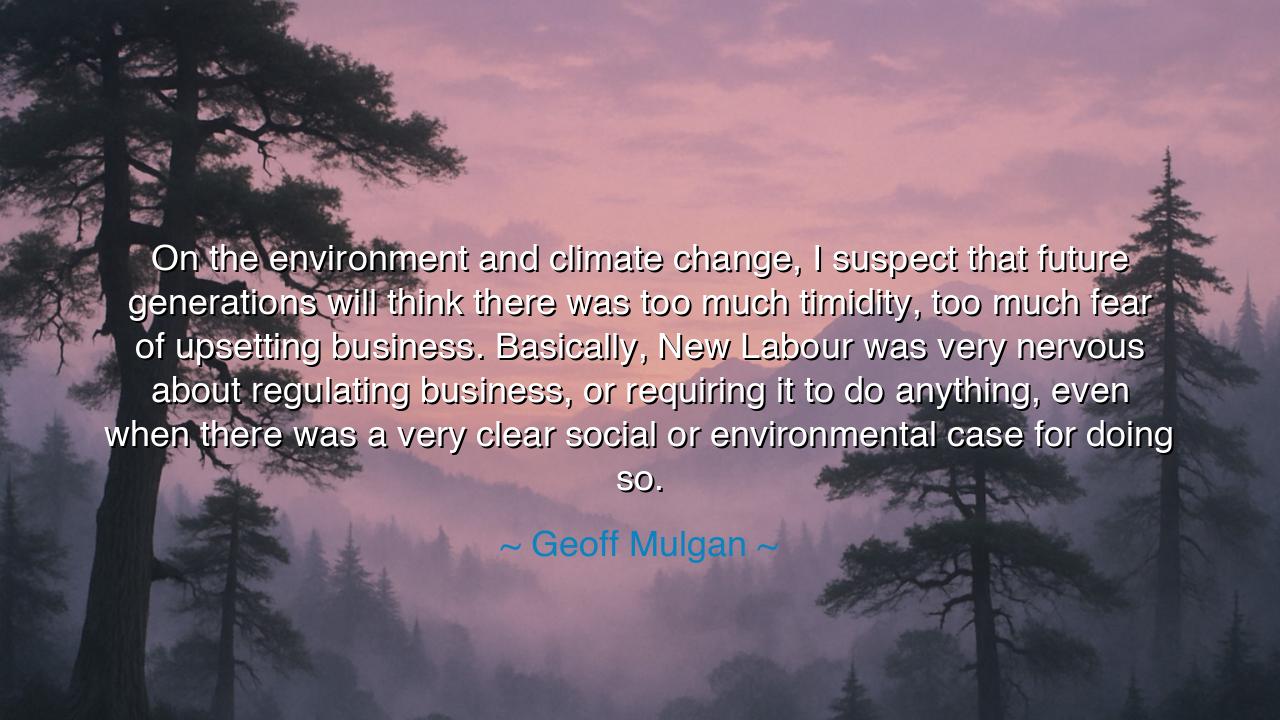
On the environment and climate change, I suspect that future
On the environment and climate change, I suspect that future generations will think there was too much timidity, too much fear of upsetting business. Basically, New Labour was very nervous about regulating business, or requiring it to do anything, even when there was a very clear social or environmental case for doing so.






In the tone of a reflective philosopher, Geoff Mulgan once said, “On the environment and climate change, I suspect that future generations will think there was too much timidity, too much fear of upsetting business. Basically, New Labour was very nervous about regulating business, or requiring it to do anything, even when there was a very clear social or environmental case for doing so.” Beneath these words lies not merely criticism, but an elegy for a time when courage yielded to caution, and duty to comfort. It is a lament for how fear—fear of conflict, fear of loss, fear of shaking the established order—can paralyze even the most well-intentioned movements.
The origin of this quote comes from Mulgan’s reflections on the political climate of Britain during the New Labour era under Tony Blair and Gordon Brown. It was a time of economic optimism, when globalization and business were seen as engines of prosperity. Yet, as Mulgan observed, that prosperity came at a price. The government hesitated to impose environmental regulations, worried that doing so might slow growth or displease powerful industries. In the pursuit of balance, they tilted too far toward appeasement. Thus, Mulgan’s words serve as both a confession and a warning—that timidity in the face of moral responsibility is itself a form of failure, one that history never forgets.
To the ancients, this would have been recognized as the error of inaction cloaked in prudence. The Stoics taught that courage is not recklessness, but the strength to act when conscience demands it. In the same way, Mulgan calls us to remember that moderation, when taken too far, becomes complicity. Just as a physician who fears offending a patient may let a sickness spread, so too does a leader who fears offending the powerful allow corruption to fester. There are moments in history when justice must outweigh convenience, and wisdom must become bold.
The “fear of upsetting business” that Mulgan names is not confined to one age or nation. It is a recurring theme in human civilization. When industrialists in the 19th century filled the skies with smoke, few dared to challenge them, for they “created jobs.” When rivers ran black with waste, politicians hesitated to intervene, for they “fed the economy.” Only later did people realize that prosperity built on pollution is a fleeting illusion. The story of London’s Great Smog of 1952 serves as a haunting reminder. For years, the government ignored warnings from scientists and reformers, fearing regulation would hurt industry. Then, in a single week of choking fog, over 10,000 lives were lost. Only after tragedy came repentance, and the Clean Air Act was born. Courage came—but too late for the dead.
Mulgan’s insight is not one of condemnation but of sorrow. He understood that future generations would judge not only what was done, but what was left undone. The battle against climate change, he suggests, will not be remembered for the strength of our speeches, but for the weakness of our will. History will not ask whether we feared to disturb the markets, but whether we dared to defend the earth. In his words, we hear the echo of every leader who wished to do right but hesitated, every movement that faltered at the threshold of change.
Yet there is also hope in his message. For by acknowledging timidity, Mulgan invites courage. His words call upon the new generations of policymakers, scientists, and citizens to break the chains of hesitation. The “social and environmental case” for action is clearer now than ever before. Each storm, each drought, each vanishing species bears witness to what fear has cost us. The lesson is simple but urgent: leadership demands not the absence of fear, but the triumph over it.
Let this be the lesson for our age and for those yet unborn: when the world stands on the brink, gentleness toward power becomes cruelty toward posterity. True courage is not the roar of defiance, but the quiet resolve to do what is necessary, even when it is unpopular. Demand accountability from those who govern, and act as stewards of the earth in your own lives. Confront the convenient lie that growth and goodness must be enemies, and instead build a world where prosperity is measured not in profit, but in balance and beauty.
So remember, children of the future: timidity is the great enemy of progress. As Geoff Mulgan warns, the sins of omission weigh as heavily as the sins of commission. When the moment comes to defend the planet, do not hesitate. Speak when silence seems easier, act when waiting feels safer. For it is through courage—moral, political, and personal—that humanity will earn the forgiveness of those yet to come.






AAdministratorAdministrator
Welcome, honored guests. Please leave a comment, we will respond soon